Search Result
Results for "
CSF1 Inhibitors
" in MedChemExpress (MCE) Product Catalog:
| Cat. No. |
Product Name |
Target |
Research Areas |
Chemical Structure |
-
- HY-112451
-
-
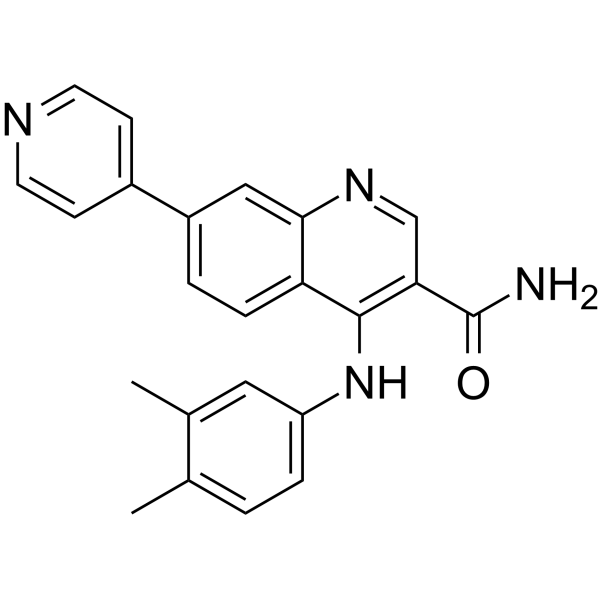
-
- HY-145809
-
-
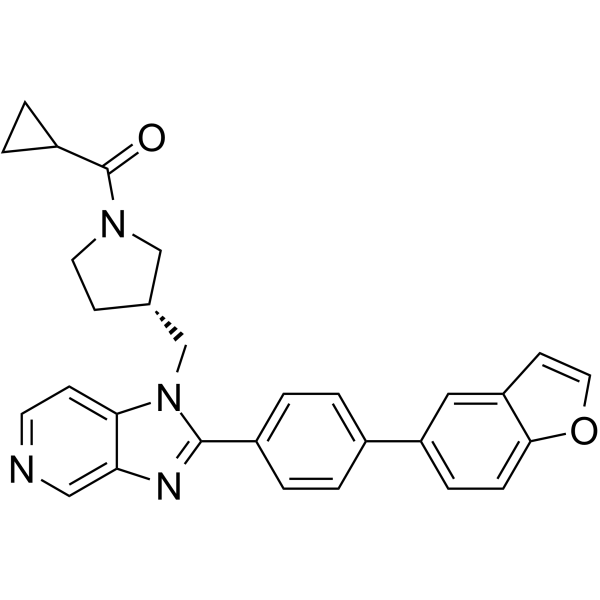
-
- HY-155001
-
|
|
c-Fms
|
Others
|
|
CSF1R-IN-15 (compound 23) is an inhibitor targeting CSF1R. The colony-stimulating factor-1 receptor (CSF1R) is a tyrosine kinase embedded in the cell membrane of macrophages. The receptor is activated by colony-stimulating factor-1 (CSF-1) and interleukin-34, and signaling via CSF1R is crucial for the differentiation, proliferation, and survival of macrophages .
|
-
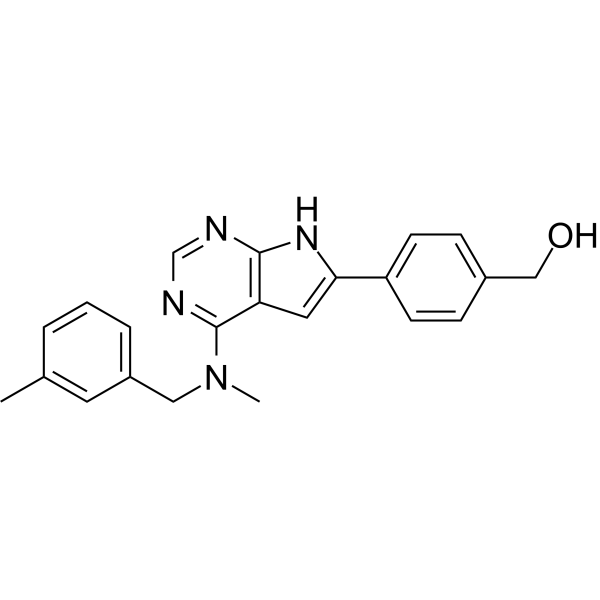
-
- HY-147615
-
|
|
c-Fms
|
Cancer
|
|
CSF1R-IN-12 is a potent inhibitor of CSF1R. Colony stimulating factor 1 (CSF-1, also known as macrophage colony stimulating factor, M-CSF) is an important growth factor that controls bone marrow progenitor cells, monocytes, macrophages, and giants. CSF1R-IN-12 has the potential for the research of cancer diseases (extracted from patent WO2019134661A1, compound 1) .
|
-
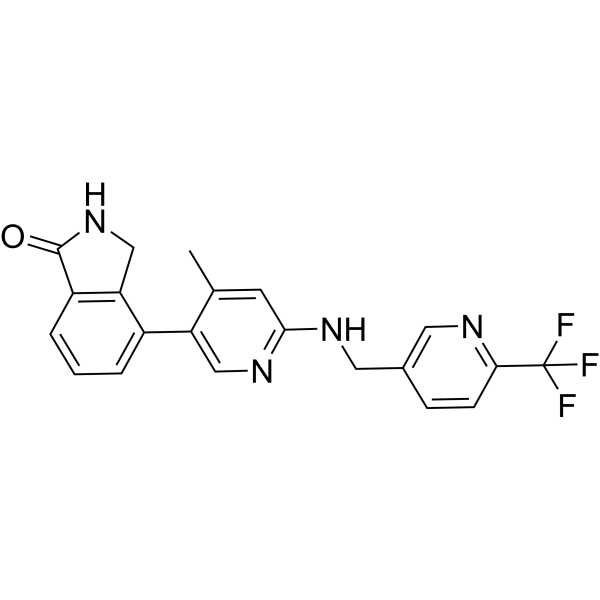
-
- HY-147616
-
|
|
c-Fms
|
Cancer
|
|
CSF1R-IN-13 is a potent inhibitor of CSF1R. Colony stimulating factor 1 (CSF-1, also known as macrophage colony stimulating factor, M-CSF) is an important growth factor that controls bone marrow progenitor cells, monocytes, macrophages, and giants. CSF1R-IN-13 has the potential for the research of cancer diseases (extracted from patent WO2019134661A1, compound 32) .
|
-
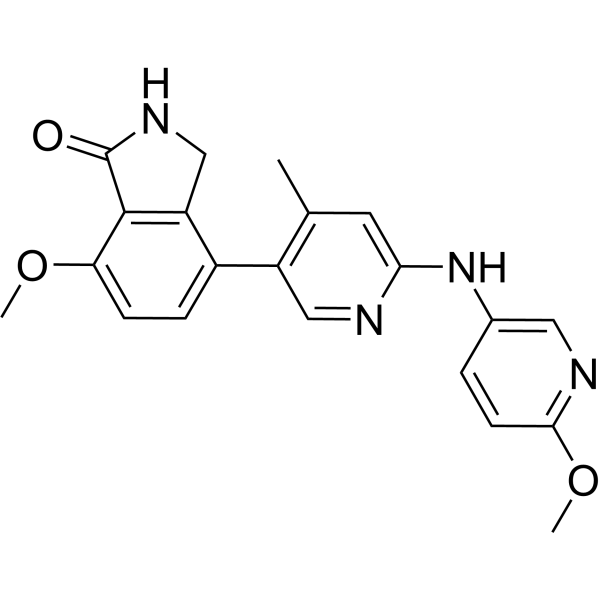
-
- HY-12768B
-
|
BLZ945 dihydrochloride
|
c-Fms
|
Neurological Disease
Cancer
|
|
Sotuletinib (BLZ945) dihydrochloride is an orally active and blood-brain barrier-permeable CSF1-R-specific inhibitor (IC50=1 nM). Sotuletinib (BLZ945) dihydrochloride induces tumor cell apoptosis and effectively inhibits tumor growth in mouse models. Sotuletinib dihydrochloride can be used in cancer and amyotrophic lateral sclerosis (ALS) research .
|
-
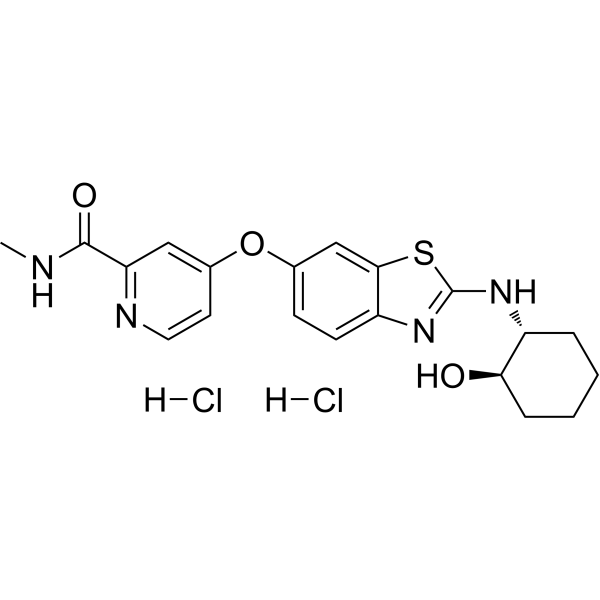
-
- HY-147617
-
|
|
c-Fms
|
Cancer
|
|
CSF1R-IN-14 is an isoindolinone derivative compound. CSF1R-IN-14 is a potent inhibitor of CSF1R. Colony stimulating factor 1 (CSF-1, also known as macrophage colony stimulating factor, M-CSF) is an important growth factor that controls bone marrow progenitor cells, monocytes, macrophages, and giants. CSF1R-IN-14 has the potential for the research of cancer diseases (extracted from patent WO2019134662A1, compound 1) .
|
-
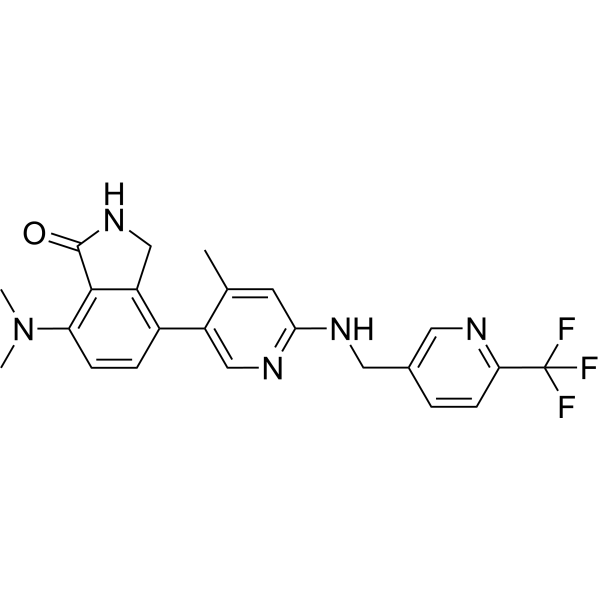
-
- HY-162309
-
|
|
c-Fms
|
Cancer
|
|
CSF1R-IN-20 (compound 7a) is a CSF-1R Inhibitor with an IC50 value of 467 nM. CSF1R-IN-20 inhibits CSF-1R auto-phosphorylation .
|
-
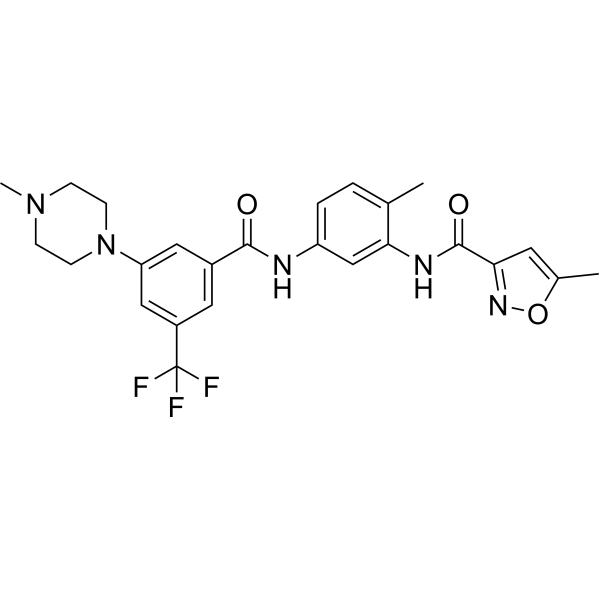
-
- HY-157996
-
|
|
c-Fms
|
Neurological Disease
|
|
CSF1R-IN-21 (compound 7e) is a CSF-1R Inhibitor with an IC50 value of 31 nM. CSF1R-IN-21 inhibits CSF-1R auto-phosphorylation and can be used for the research of neurodegenerative diseases .
|
-
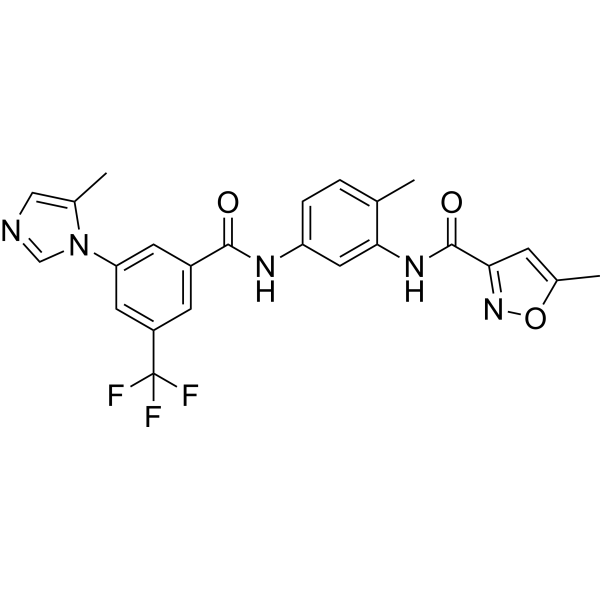
-
- HY-147608
-
|
|
c-Fms
|
Neurological Disease
|
|
CSF1R-IN-7 (Formula I) is a CSF-1R inhibitor. CSF1R-IN-7 can be used for Alzheimer’s disease research .
|
-
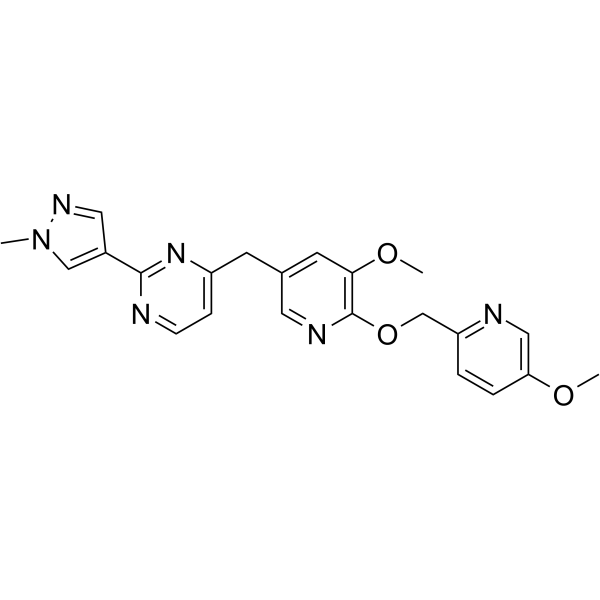
-
- HY-144040
-
|
|
c-Fms
|
Cancer
|
|
CSF1R-IN-4 is a potent inhibitor of CSF1R. CSF-1R is expressed in macrophages, and the survival and differentiation of macrophages depends on the CSF-1/CSF-1R signaling pathway. CSF1R-IN-4 affects the exchange of inflammatory factors between TAMs and glioma cells. CSF1R-IN-4 has the potential for the research of cancer disease (extracted from patent WO2021197276A1, compound 104) .
|
-
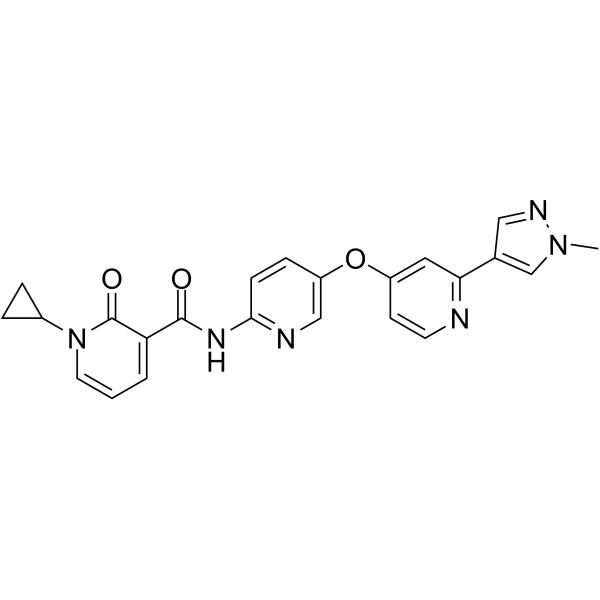
-
- HY-144041
-
|
|
c-Fms
|
Cancer
|
|
CSF1R-IN-5 is a potent inhibitor of CSF1R. CSF-1R is expressed in macrophages, and the survival and differentiation of macrophages depends on the CSF-1/CSF-1R signaling pathway. CSF1R-IN-5 affects the exchange of inflammatory factors between TAMs and glioma cells. CSF1R-IN-5 has the potential for the research of cancer disease (extracted from patent WO2021197276A1, compound 11) .
|
-
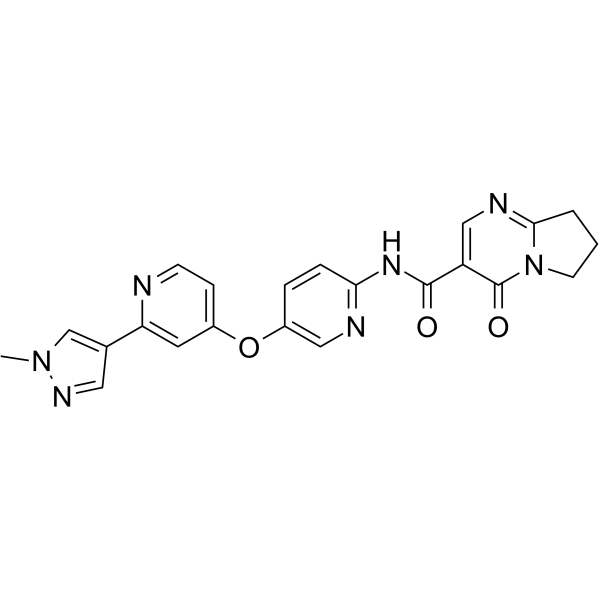
-
- HY-144042
-
|
|
c-Fms
|
Cancer
|
|
CSF1R-IN-6 is a potent inhibitor of CSF1R. CSF-1R is expressed in macrophages, and the survival and differentiation of macrophages depends on the CSF-1/CSF-1R signaling pathway. CSF1R-IN-6 affects the exchange of inflammatory factors between TAMs and glioma cells. CSF1R-IN-6 has the potential for the research of cancer disease (extracted from patent WO2021197276A1, compound 5) .
|
-
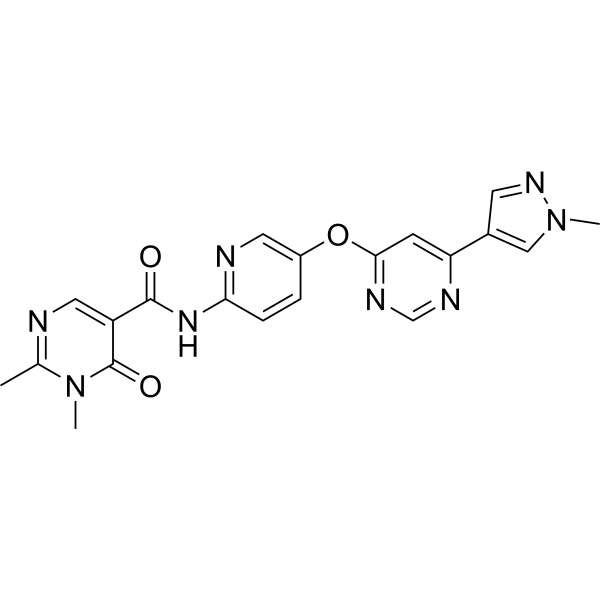
-
- HY-147611
-
|
|
c-Fms
|
Cancer
|
|
CSF1R-IN-10 (Compound 48) is a CSF-1R inhibitor with an IC50 of 0.005 μM .
|
-
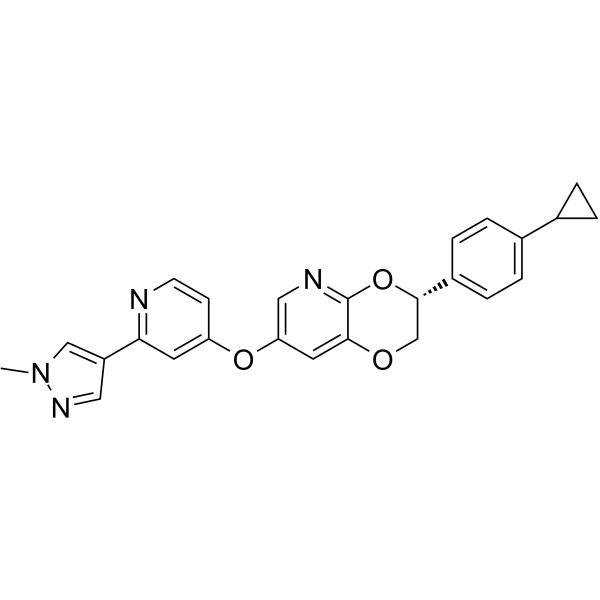
-
- HY-147609
-
|
|
c-Fms
|
Cancer
|
|
CSF1R-IN-8 (Compound 22) is a CSF-1R inhibitor with an IC50 of 0.012 μM .
|
-
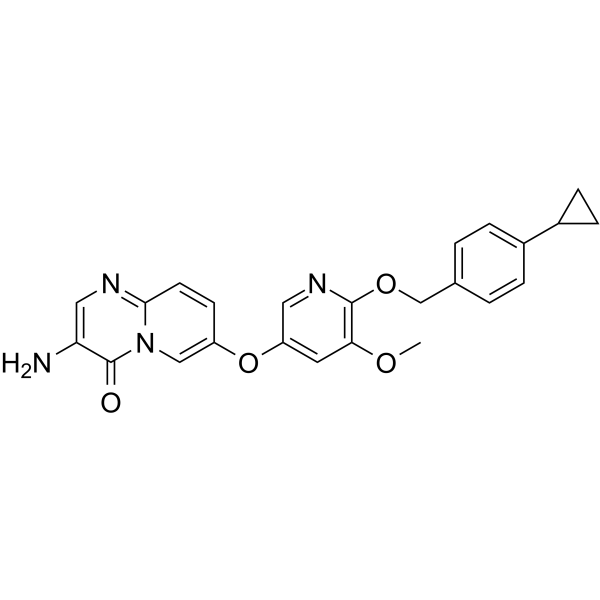
-
- HY-147610
-
|
|
c-Fms
|
Cancer
|
|
CSF1R-IN-9 (Compound 46) is a CSF-1R inhibitor with an IC50 of 0.028 μM .
|
-
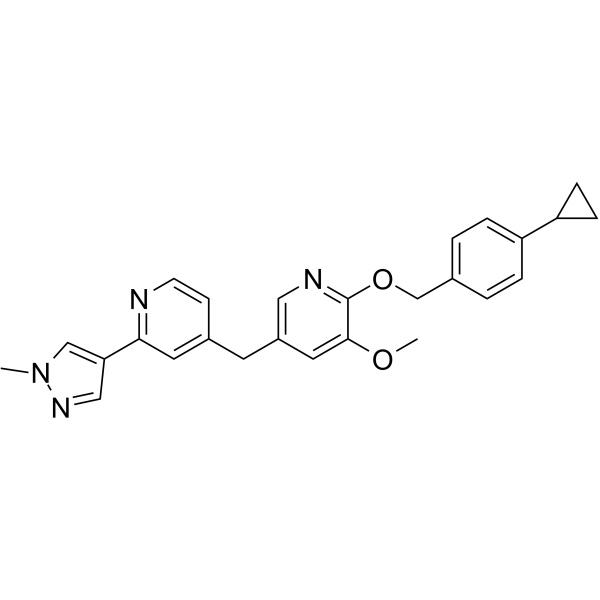
-
- HY-157422
-
|
|
c-Fms
|
Cancer
|
|
CSF1R-IN-19 is a potent inhibitor of CSF1R. CSF1R-IN-19 affects the exchange of inflammatory factors between TAMs and glioma cells. CSF1R-IN-19 has the potential for the research of cancer .
|
-
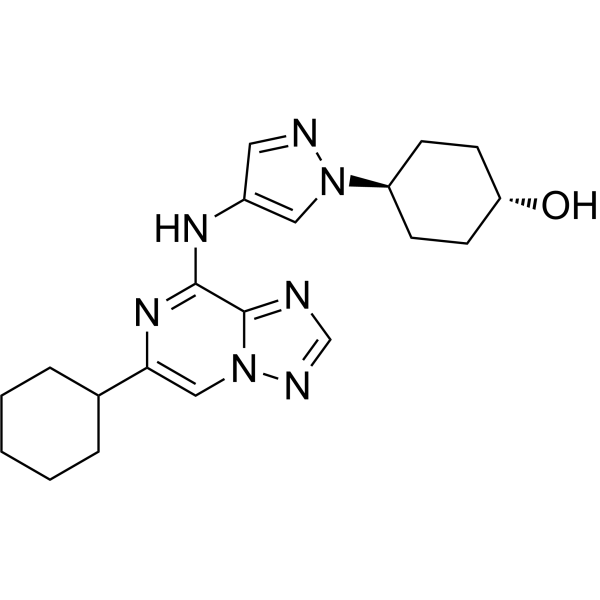
-
- HY-101774
-
|
|
c-Fms
|
Cancer
|
|
CSF1R-IN-1 is a CSF1R inhibitor with an with an IC50 of 0.5 nM.
|
-
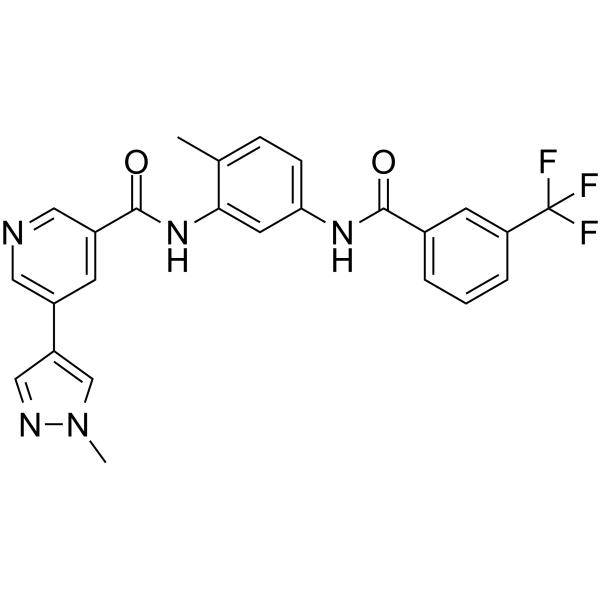
-
- HY-155550
-
|
|
c-Fms
|
Inflammation/Immunology
|
|
CSF1R-IN-17 (compound 9) is a potent and selective CSF1R antagonist, with an IC50 of 0.2 nM. CSF1R-IN-17 can inhibit osteoclast differentiation .
|
-
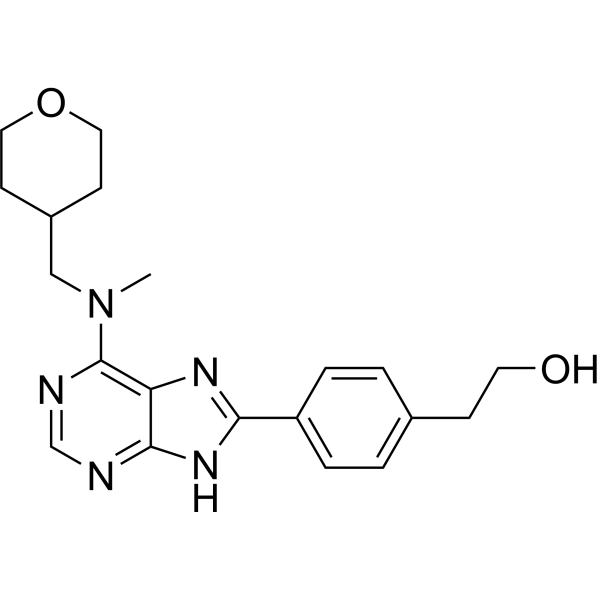
-
- HY-139990
-
|
|
c-Fms
|
Cancer
|
|
CSF1R-IN-3 (compound 21) is a potent and orally active CSF-1R inhibitor (IC50=2.1 nM). CSF1R-IN-3 is a potent antiproliferative activity against colorectal cancer cells. CSF1R-IN-3 inhibits the progression of colorectal cancer by suppressing the migration of macrophages, reprograming M2-like macrophages to the M1 phenotype, and enhancing the antitumor immunity .
|
-
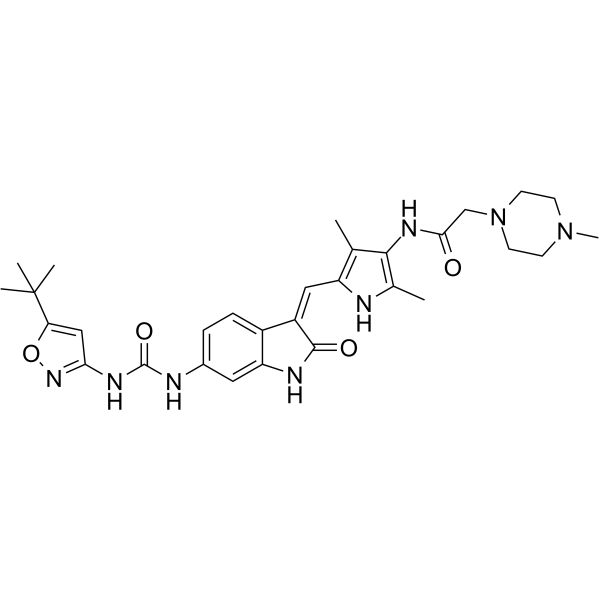
-
- HY-158148
-
|
|
c-Fms
|
Neurological Disease
Inflammation/Immunology
|
|
CSF1R-IN-23 (Compound 7dri) is a selective inhibitor for colony-stimulating factor-1 receptor (CSF1R), with IC50 of 36.1 nM. CSF1R-IN-23 serves as antineuroinflammatory agent in mouse model. CSF1R-IN-23 is blood brain barrier (BBB) permeable .
|
-
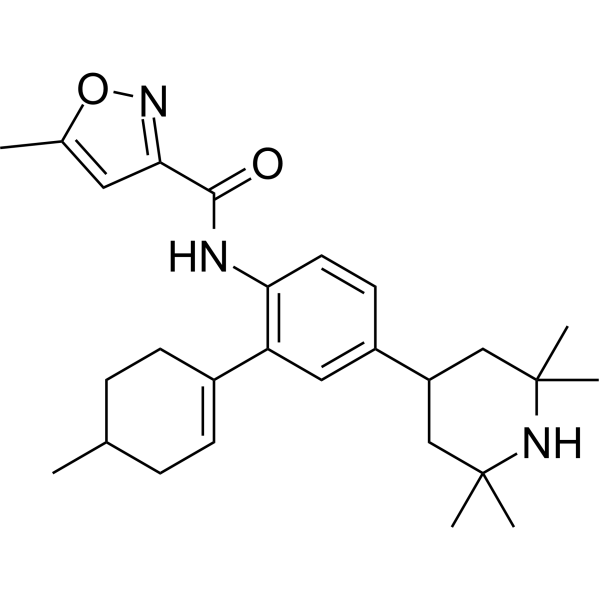
-
- HY-161084
-
|
|
c-Fms
|
Neurological Disease
Cancer
|
|
CSF1R-IN-18 (Compdound 16t), para-aniline derivative, is a colony-stimulating factor 1 receptor (CSF1R) inhibitor. CSF1R-IN-18 can be used for the research of cancers, CNS-diseases and bone diseases .
|
-
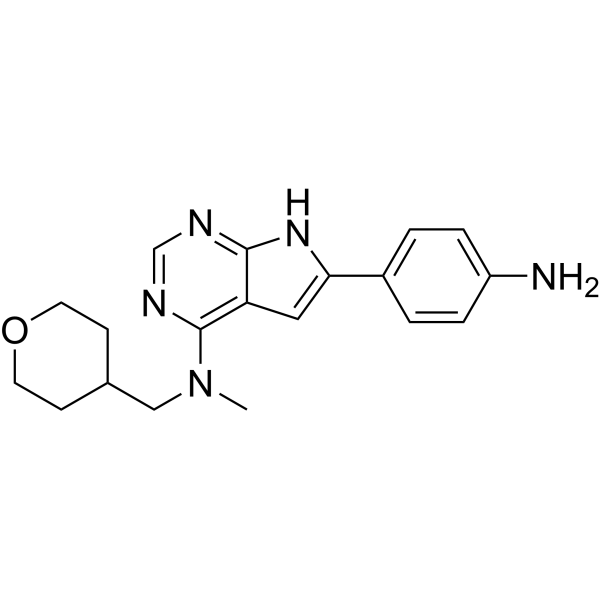
-
- HY-117244
-
AZD7507
1 Publications Verification
|
c-Fms
|
Cancer
|
|
AZD7507 is a potent and orally active CSF-1R inhibitor, with antitumor activity.
|
-
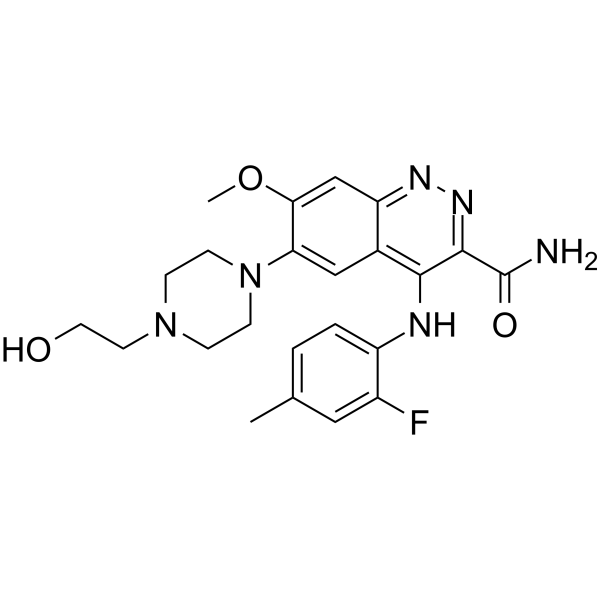
-
- HY-P99245
-
|
RG 7155; RO 5509554
|
c-Fms
|
Cancer
|
|
Emactuzumab(RG 7155) is a specific monoclonal antibody that inhibits colonystimulating factor 1 receptor (CSF1R) activation. Emactuzumab has high affinity for CSF-1R with Ki value of 0.2 nM to blocks CSF-1R dimerization. Emactuzumab can be used for the research of several diseases, such as diffuse-type tenosynovial giant cell tumour (dt-GCT) .
|
-

-
- HY-153277
-
-
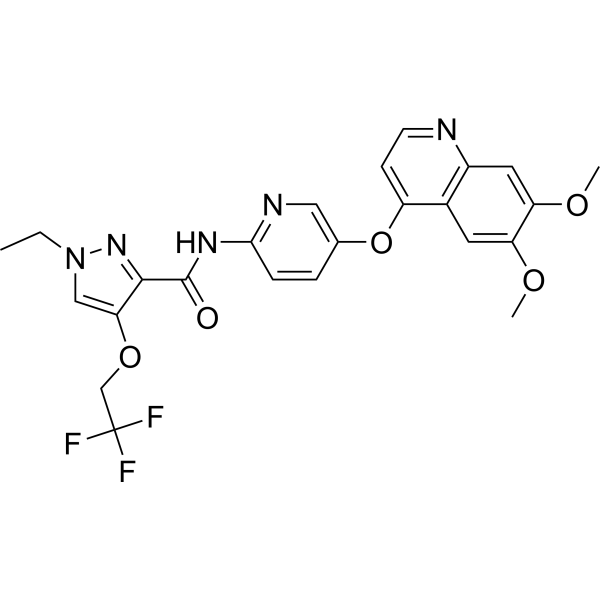
-
- HY-101526
-
|
RA03546849
|
c-Fms
|
Inflammation/Immunology
|
|
GENZ-882706 is a potent colony stimulating factor-1 receptor (CSF-1R) Inhibitor extracted from patent WO 2017015267A1.
|
-
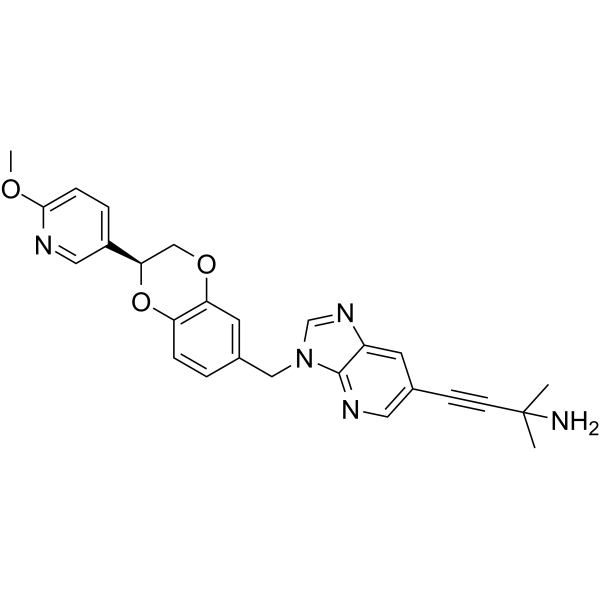
-
- HY-153920
-
|
ABSK021
|
c-Fms
|
Cancer
|
|
Pimicotinib is a CSF1R inhibitor with antitumor activity .
|
-
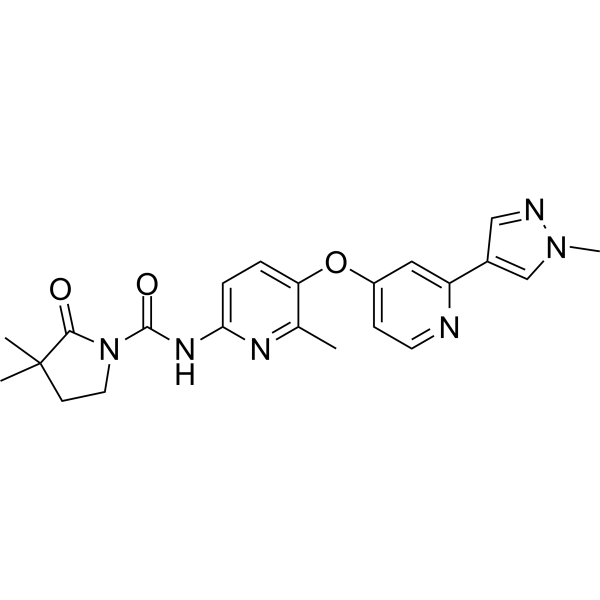
-
- HY-119942
-
|
|
c-Fms
|
Cancer
|
|
c-Fms-IN-8 (compound 4a) is a colony stimulating factor-1 receptor (CSF-1R, c-FMS) Type II inhibitor, with an IC50 of 9.1 nM .
|
-
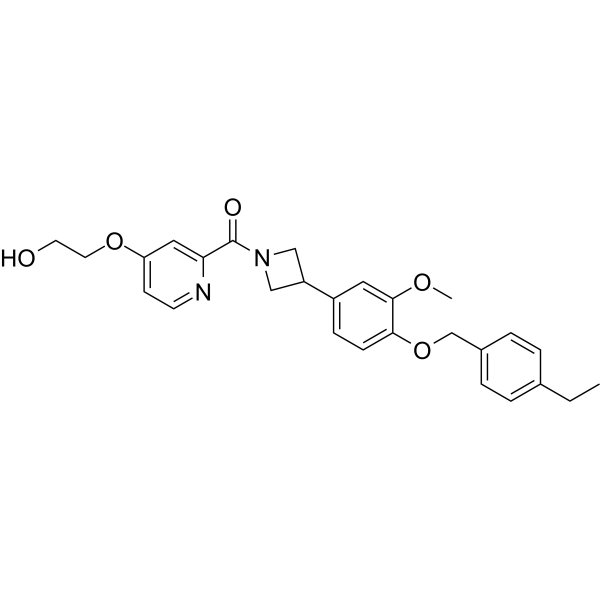
-
- HY-136362
-
|
|
c-Fms
|
Inflammation/Immunology
Cancer
|
|
ARRY-382 is a potent, oral and highly selective inhibitor of CSF1R/c-Fms with an IC50 of 9 nM. ARRY-382 can be used for the research of advanced or metastatic cancers .
|
-
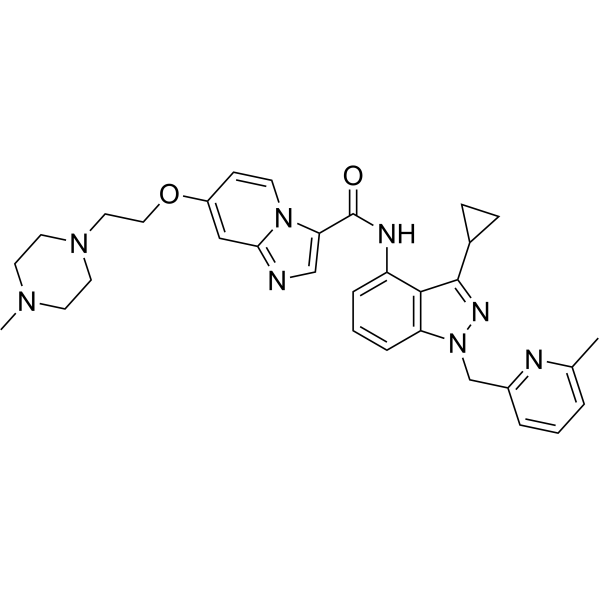
-
- HY-122906
-
|
|
c-Fms
|
Inflammation/Immunology
|
|
JTE-952 is a potent, oral active and selective Type II inhibitor of colony stimulating factor-1 receptor (CSF-1R or cFMS, type III receptor tyrosine kinase), with IC50 values of 13 nM and 261 nM for CSF1R and TrkA , respectively. Effective against a mouse collagen-induced model of arthritis .
|
-
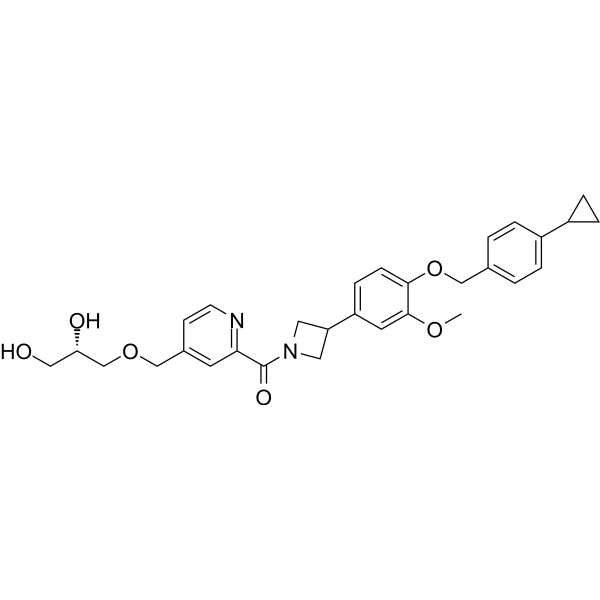
-
- HY-12768
-
|
BLZ945
|
c-Fms
|
Cancer
|
|
Sotuletinib (BLZ945) is a potent, selective and brain-penetrant CSF-1R (c-Fms) inhibitor with an IC50 of 1 nM, showing more than 1,000-fold selectivity against its closest receptor tyrosine kinase homologs .
|
-
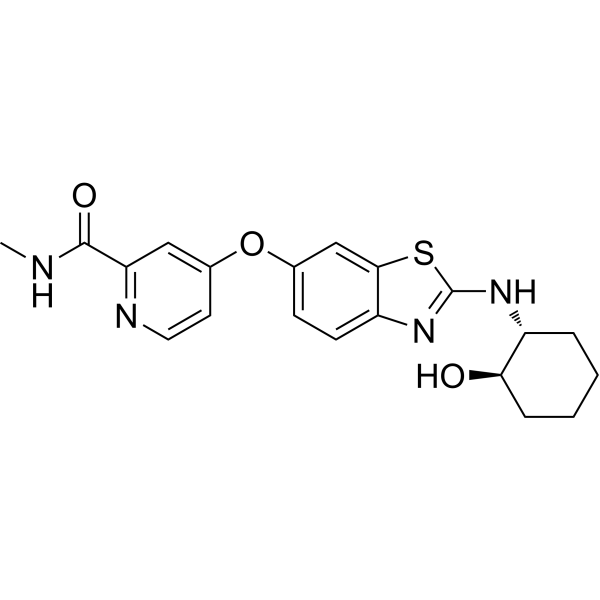
-
- HY-12768A
-
|
BLZ945 hydrochloride
|
c-Fms
|
Cancer
|
|
Sotuletinib (BLZ945) hydrochloride is a potent, selective and brain-penetrant CSF-1R (c-Fms) inhibitor with an IC50 of 1 nM, showing more than 1,000-fold selectivity against its closest receptor tyrosine kinase homologs .
|
-
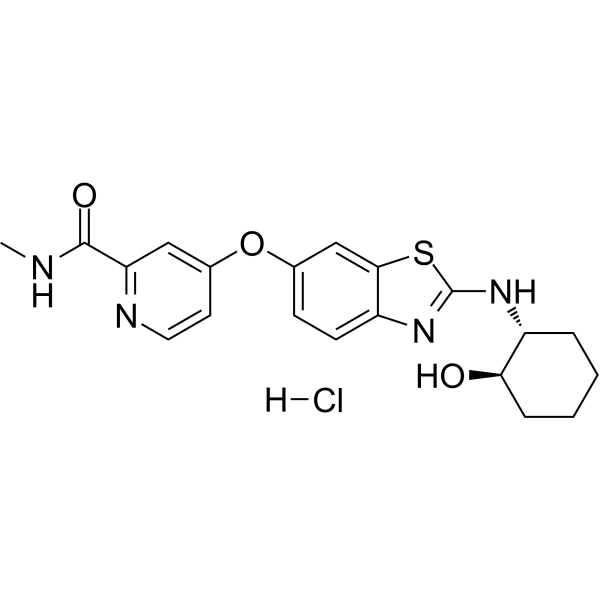
-
- HY-126297
-
|
|
c-Fms
|
Inflammation/Immunology
Cancer
|
|
c-Fms-IN-10 is the derivative of thieno [3,2-d] pyrimidine, an kinase inhibitor of FMS (Colony stimulating factor-1 receptor, CSF-1R) with IC50 of 2 nM.
c-Fms-IN-10 has anti-tumor activity .
|
-
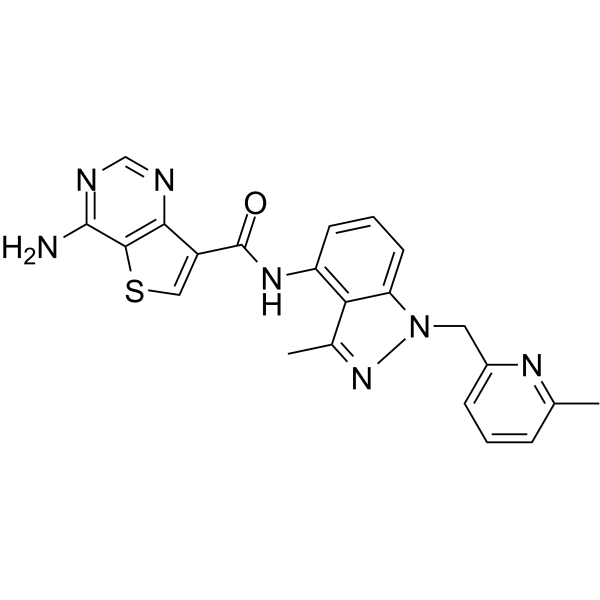
-
- HY-101768
-
PRN1371
1 Publications Verification
|
FGFR
c-Fms
|
Cancer
|
|
PRN1371 is a highly selective and potent FGFR1-4 and CSF1R inhibitor with IC50s of 0.6, 1.3, 4.1, 19.3 and 8.1 nM for FGFR1, FGFR2, FGFR3, FGFR4 and CSF1R, respectively .
|
-
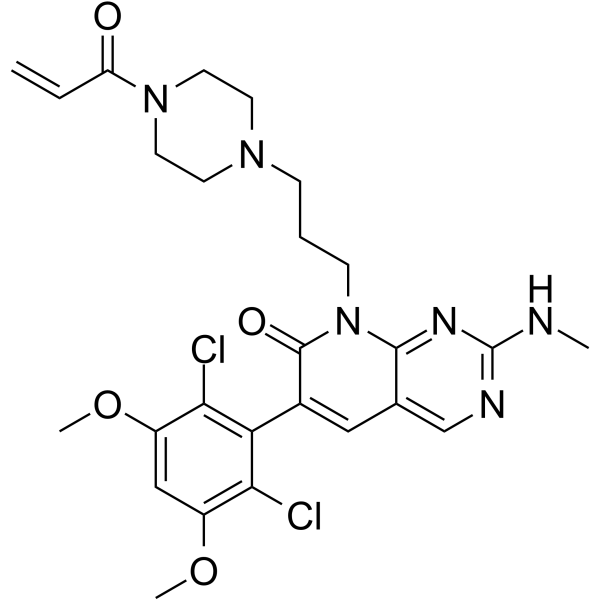
-
- HY-161025
-
|
|
c-Fms
VEGFR
|
Cancer
|
|
SYHA1813 is a dual inhibitor of CSF1R and VEGFR. SYHA1813 has potent antitumor activity against GBM .
|
-
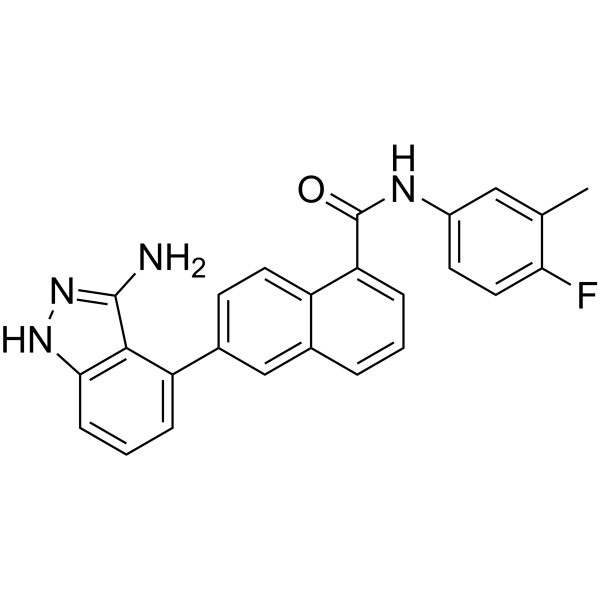
-
- HY-132935
-
|
|
c-Fms
|
Inflammation/Immunology
Cancer
|
|
BPR1R024 is an orally active and selective colony-stimulating factor-1 receptor (CSF1R) inhibitor. BPR1R024 has potent CSF1R inhibition activity with an IC50 value of 0.53 nM. BPR1R024 can be used for the research of immuno-oncology .
|
-
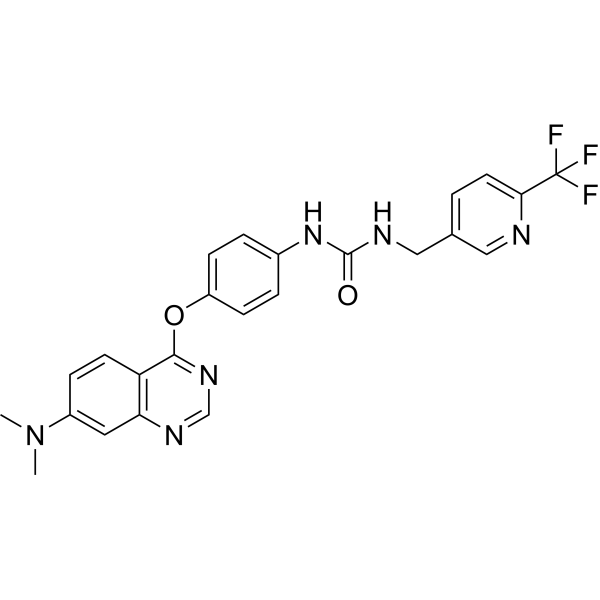
-
- HY-10204
-
OSI-930
4 Publications Verification
|
c-Kit
VEGFR
c-Fms
Apoptosis
|
Cancer
|
|
OSI-930 is an orally selective inhibitor of Kit, KDR and CSF-1R (c-Fms) with IC50s of 80 nM, 9 nM and 15 nM, respectively. OSI-930 also moderately inhibits Flt-1, c-Raf, Lck and low activity against PDGFRα/β, Flt-3 and Abl. OSI-930 has antitumor activity .
|
-
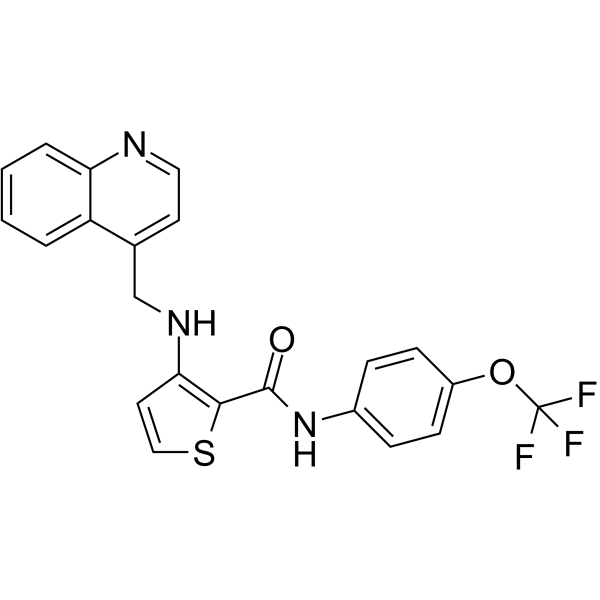
-
- HY-124526
-
|
Ibcasertib; CS2164
|
VEGFR
PDGFR
c-Kit
Aurora Kinase
c-Fms
|
Cancer
|
|
Chiauranib (CS2164) is an orally active multi-target inhibitor against tumor angiogenesis. Chiauranib potently inhibits the angiogenesis-related kinases (VEGFR1, VEGFR2, VEGFR3, PDGFRα and c-Kit), mitosis-related kinase Aurora B, and chronic inflammation-related kinase CSF-1R, with IC50 values ranging from 1-9 nM. Chiauranib has strongly anticancer effects .
|
-
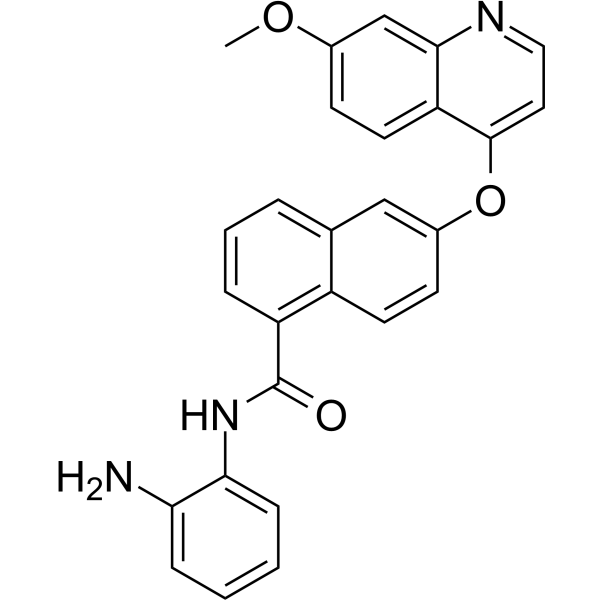
-
- HY-153243
-
|
|
c-Fms
|
Cancer
|
|
IACS-9439 is a potent, selective, and orally active CSF1R inhibitor with a Ki value of 1 nM inhibitor. IACS-9439 can be used for advanced solid tumors research .
|
-
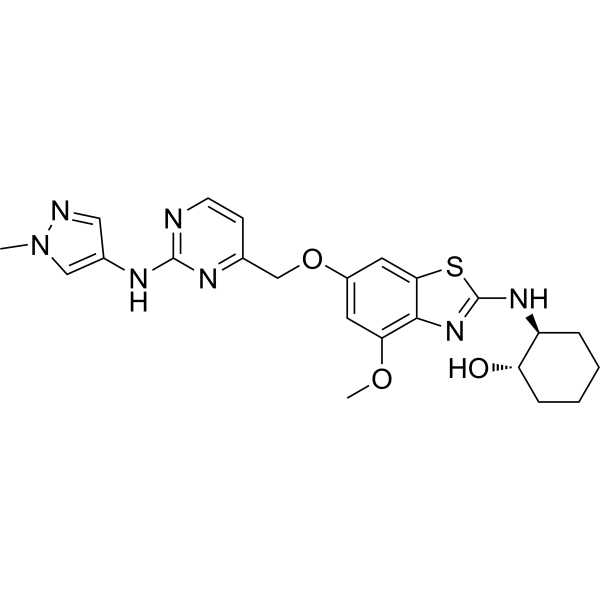
-
- HY-153012
-
|
|
TAM Receptor
c-Fms
|
Cancer
|
|
Axl/Mer-IN-1 (Compound 1) is an Axl/Mer receptor tyrosine kinase (Axl/Mer RTK) and CSF1R inhibitor with Kds of <0.1 μM .
|
-
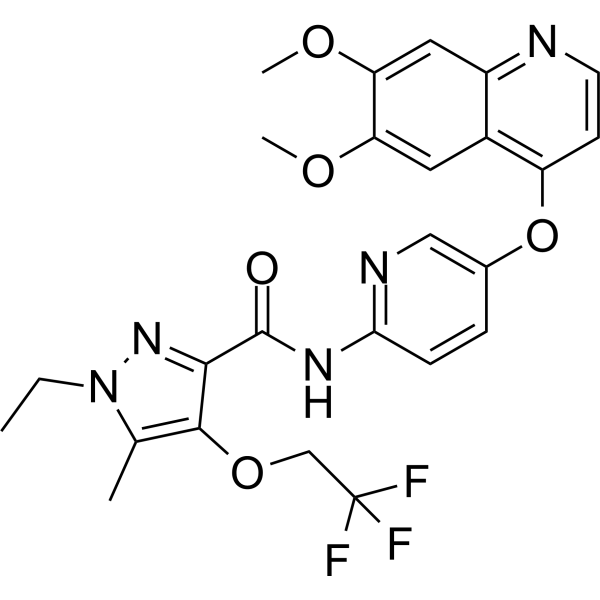
-
- HY-16749A
-
|
PLX-3397 hydrochloride
|
c-Fms
c-Kit
Apoptosis
|
Cancer
|
|
Pexidartinib hydrochloride (PLX-3397 hydrochloride) is a potent, orally active, selective, and ATP-competitive colony stimulating factor 1 receptor (CSF1R or M-CSFR) and c-Kit inhibitor, with IC50s of 20 and 10 nM, respectively. Pexidartinib hydrochloride exhibits 10- to 100-fold selectivity for c-Kit and CSF1R over other related kinases. Pexidartinib hydrochloride induces cell apoptosis and has anti-cancer activity .
|
-
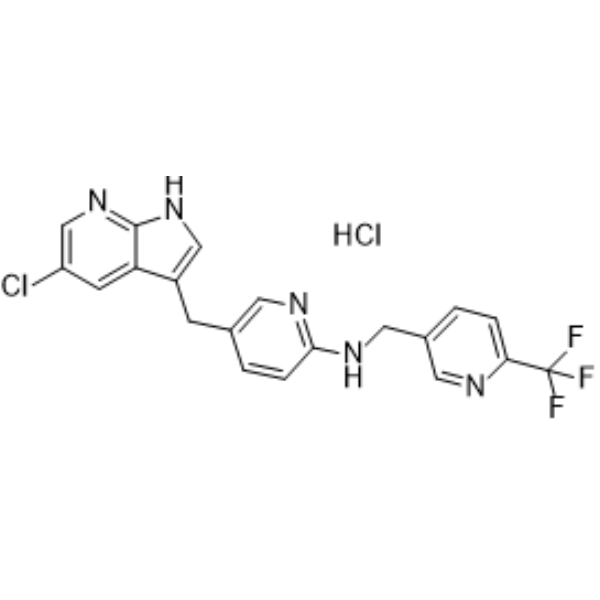
-
- HY-132935A
-
|
|
c-Fms
|
Inflammation/Immunology
Cancer
|
|
BPR1R024 mesylate is an orally active and selective colony-stimulating factor-1 receptor (CSF1R) inhibitor.
BPR1R024 mesylate is the equivalent of BPR1R024 (HY-132935). BPR1R024 has potent CSF1R inhibition activity with an IC50 value of 0.53 nM. BPR1R024 can be used for the research of immuno-oncology .
|
-
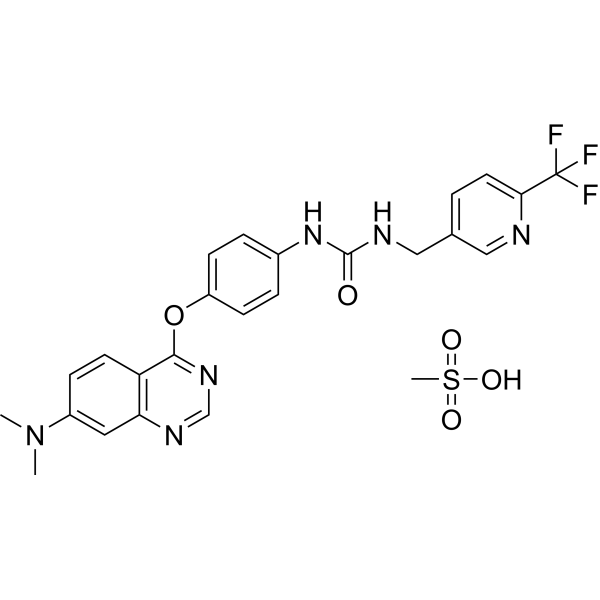
-
- HY-10408
-
Ki20227
5 Publications Verification
|
c-Fms
VEGFR
c-Kit
PDGFR
|
Inflammation/Immunology
|
|
Ki20227 is an orally active and highly selective c-Fms tyrosine kinase (CSF1R) inhibitor with IC50s of 2 nM, 12 nM, 451 and 217 nM for CSF1R, VEGFR2 (vascular endothelial growth factor receptor-2), c-Kit (stem cell factor receptor) and PDGFRβ (platelet-derived growth factor receptor β). Ki20227 suppresses osteoclast differentiation and osteolytic bone destruction .
|
-
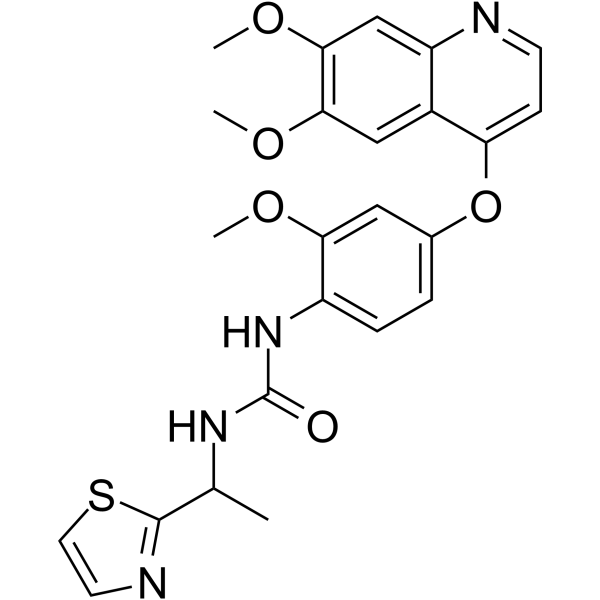
-
- HY-109086
-
|
JNJ-40346527; JNJ-527
|
c-Fms
|
Neurological Disease
Inflammation/Immunology
|
|
Edicotinib (JNJ-40346527) is a potent, selective, brain penetrant and orally active colony-stimulating factor-1 receptor (CSF-1R) inhibitor with an IC50 of 3.2 nM. Edicotinib exhibits less inhibitory effects on KIT and FLT3 with IC50 values of 20 nM and 190 nM, respectively . Edicotinib limits microglial expansion and attenuates microglial proliferation and neurodegeneration in mice. Edicotinib has the potential for Alzheimer’s disease and rheumatoid arthritis research .
|
-
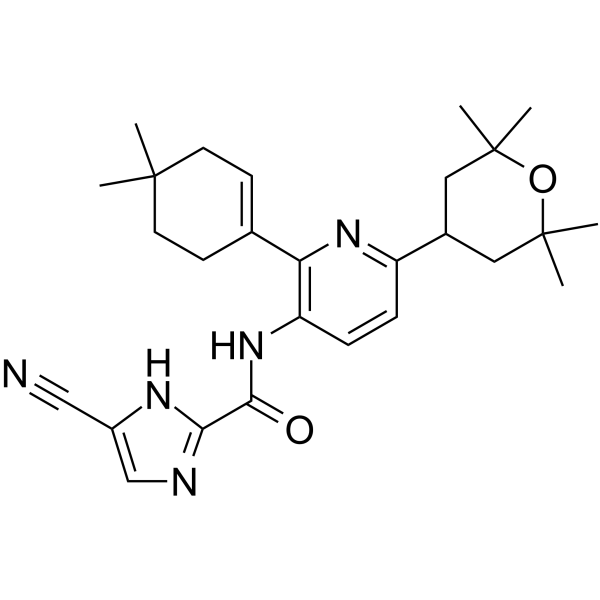
-
- HY-12297
-
|
Surufatinib; HMPL-012
|
FGFR
VEGFR
|
Cancer
|
|
Sulfatinib (Surufatinib) is a potent and highly selective tyrosine kinase inhibitor against VEGFR1/2/3, FGFR1 and CSF1R with IC50s of in a range of 1 to 24 nM.
|
-
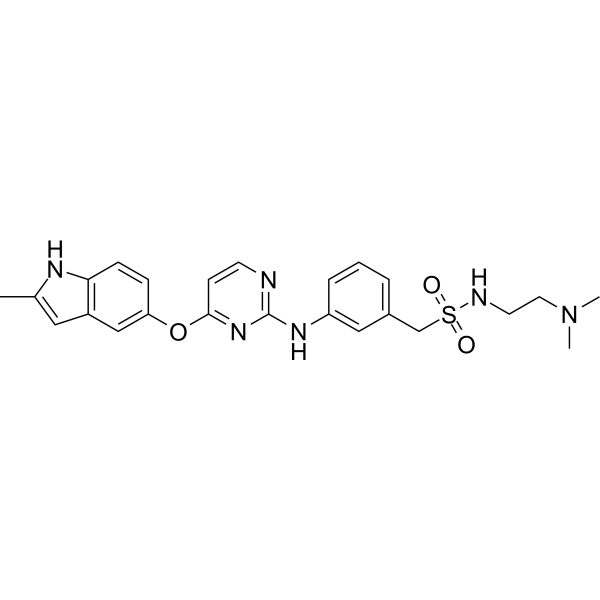
-
- HY-13493
-
|
|
PDGFR
c-Kit
FLT3
|
Cancer
|
|
AC710 is a potent PDGFR inhibitor with Kds of 0.6, 1.57, 1, 1.3, 1.0 nM for FLT3, CSF1R, KIT, PDGFRα and PDGFRβ, respectively.
|
-
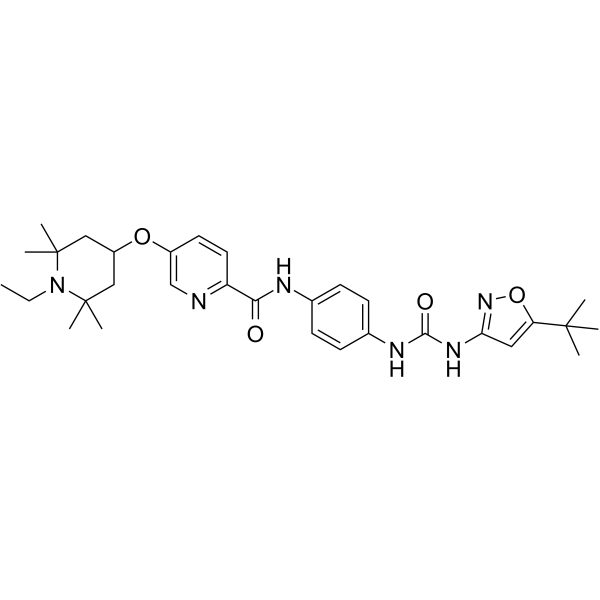
-
- HY-13493A
-
|
|
PDGFR
|
Cancer
|
|
AC710 Mesylate is a potent PDGFR inhibitor with Kds of 0.6, 1.57, 1, 1.3, 1.0 nM for FLT3, CSF1R, KIT, PDGFRα and PDGFRβ, respectively.
|
-
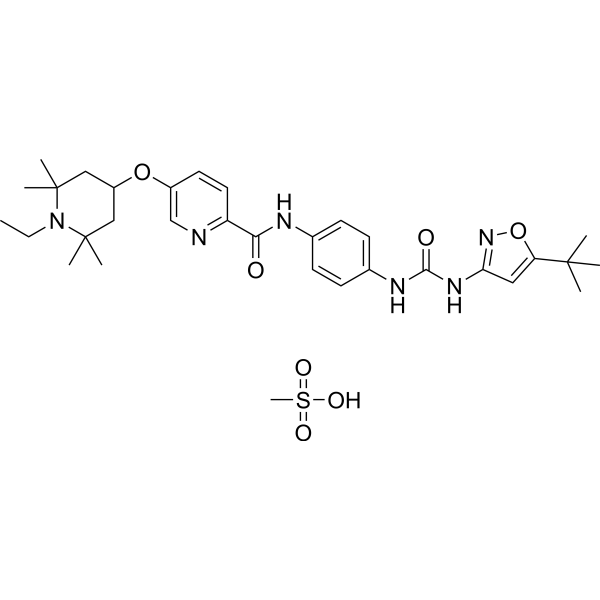
-
- HY-16749
-
Pexidartinib
Maximum Cited Publications
70 Publications Verification
PLX-3397
|
c-Fms
c-Kit
Apoptosis
|
Cancer
|
|
Pexidartinib (PLX-3397) is a potent, orally active, selective, and ATP-competitive colony stimulating factor 1 receptor (CSF1R or M-CSFR) and c-Kit inhibitor, with IC50s of 20 and 10 nM, respectively. Pexidartinib (PLX-3397) exhibits 10- to 100-fold selectivity for c-Kit and CSF1R over other related kinases. Pexidartinib (PLX-3397) induces cell apoptosis and has anti-tumor activity .
|
-
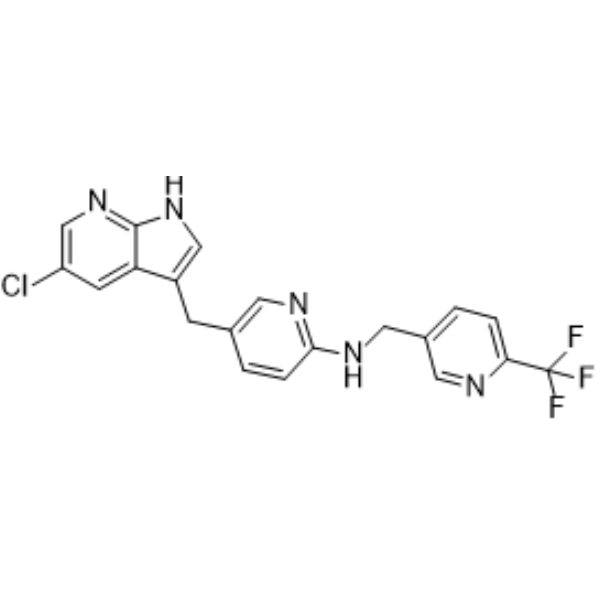
-
- HY-50905
-
|
CHIR-258; TKI258
|
FLT3
c-Kit
FGFR
VEGFR
PDGFR
c-Fms
|
Cancer
|
|
Dovitinib (CHIR-258) is an orally active, potent multi-targeted tyrosine kinase (RTK) inhibitor with IC50s of 1, 2, 36, 8/9, 10/13/8, 27/210 nM for FLT3, c-Kit, CSF-1R, FGFR1/FGFR3, VEGFR1/VEGFR2/VEGFR3 and PDGFRα/PDGFRβ, respectively. Dovitinib has potent antitumor activity .
|
-
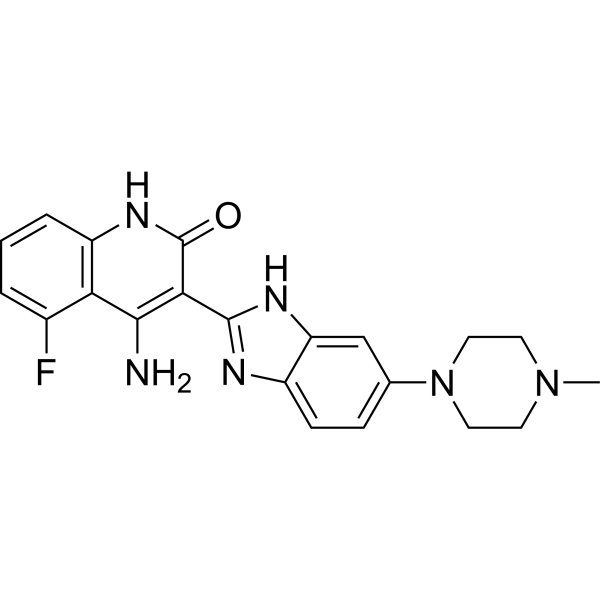
-
- HY-109190
-
|
GB002; PK10571
|
PDGFR
c-Fms
c-Kit
|
Cardiovascular Disease
|
|
Seralutinib (GB002) is an inhaled PDGFRα and PDGFRβ inhibitor. Seralutinib also targets to CSF1R and c-KIT with IC50s of 8 nM and 14 nM, respectively. Seralutinib (GB002) is used in the study for pulmonary arterial hypertension .
|
-
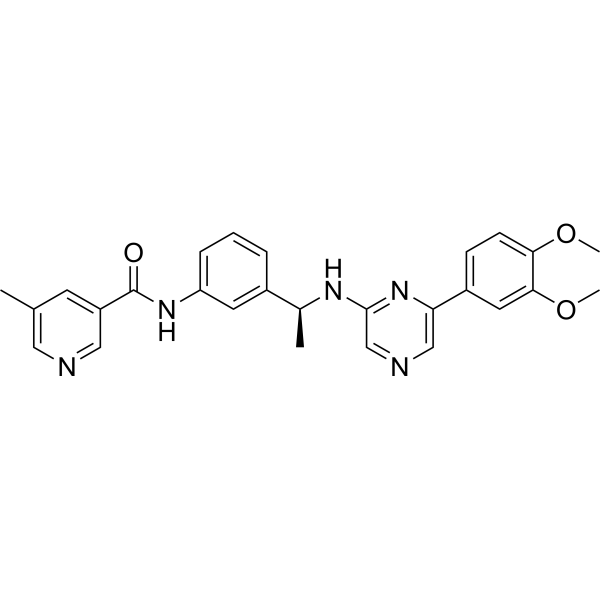
- HY-158050
-
|
|
c-Fms
|
|
|
PXB17 can inhibit CSF1R (IC50 = 1.7 nM) by blocking the activation of PI3K/ AKT/mTORC1 signaling. PXB17 is orally effective. PXB17 significantly inhibits the growth of CRC, improves PD-1 mAb efficacy and reduces tumor recurrence in CRC .
|
-
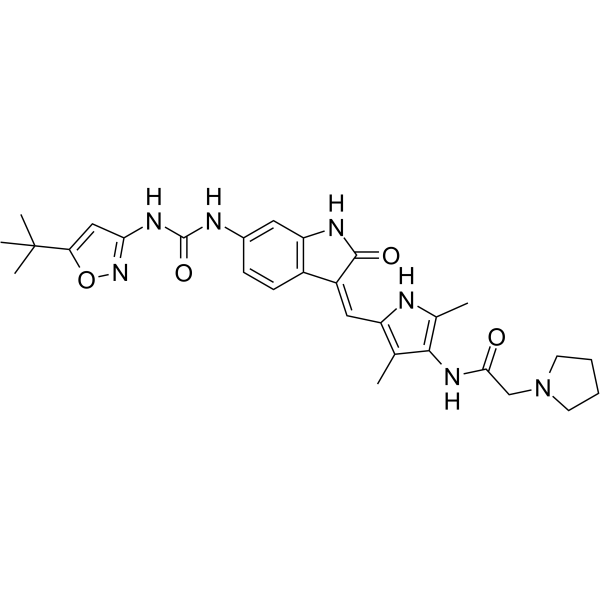
- HY-117273
-
|
|
Raf
Autophagy
|
Cancer
|
|
AZ304 is an ATP-competitive dual BRAF kinase inhibitor, potently inhibits wild type BRAF, V600E mutant BRAF and wild type CRAF, with IC50s of 79 nM, 38 nM and 68 nM, respectively. AZ304 also has significant effect on other kinases, such as p38 (IC50, 6 nM), CSF1R (IC50, 35 nM). Anti-tumor activity .
|
-
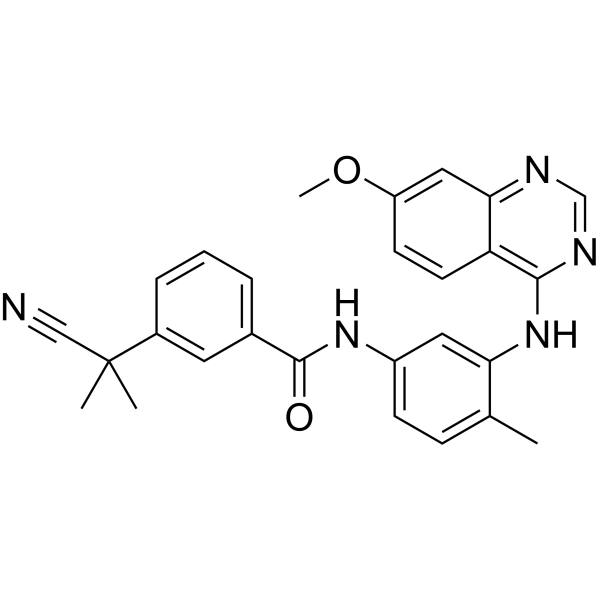
- HY-114153A
-
|
|
c-Fms
|
Neurological Disease
|
|
PLX5622 hemifumarate is a highly selective brain penetrant and orally active CSF1R inhibitor (IC50=0.016 µM; Ki=5.9 nM). PLX5622 hemifumarate allows for extended and specific microglial elimination, preceding and during pathology development. PLX5622 hemifumarate demonstrates desirable PK properties in varies animals .
|
-
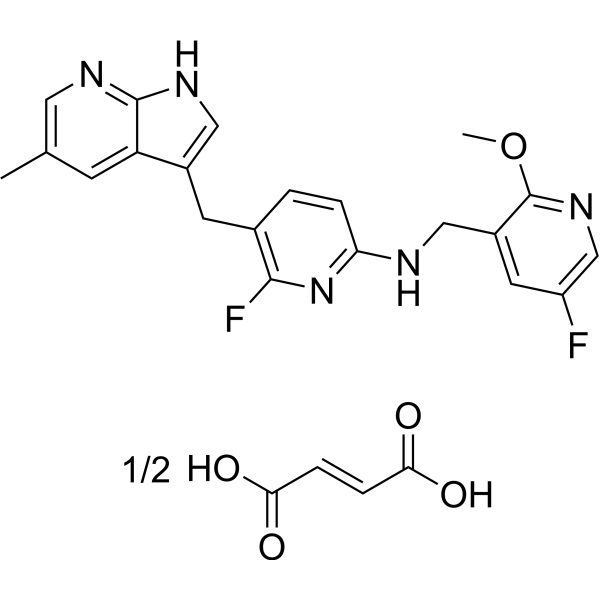
- HY-P99259
-
|
FPA 008; Anti-Human CSF1R Recombinant Antibody
|
c-Fms
|
Inflammation/Immunology
Cancer
|
|
Cabiralizumab (FPA 008) is an anti-CSF1R monoclonal antibody (MAb). Cabiralizumab enhances T cell infiltration and antitumor T cell immune responses. Cabiralizumab inhibits the activation of osteoclasts and blocks bone destruction, and can be used in the research of rheumatoid arthritis (RA). Cabiralizumab can combine with Nivolumab (HY-P9903) for lung cancer research .
|
-

- HY-114153
-
|
|
c-Fms
|
Neurological Disease
|
|
PLX5622 is a highly selective brain penetrant and orally active CSF1R inhibitor (IC50=0.016 µM; Ki=5.9 nM). PLX5622 allows for extended and specific microglial cells elimination, preceding and during pathology development. PLX5622 demonstrates desirable PK properties in varies animals. PLX5622 is mostly used in the way of feed free diet (HY-114153C) .
|
-
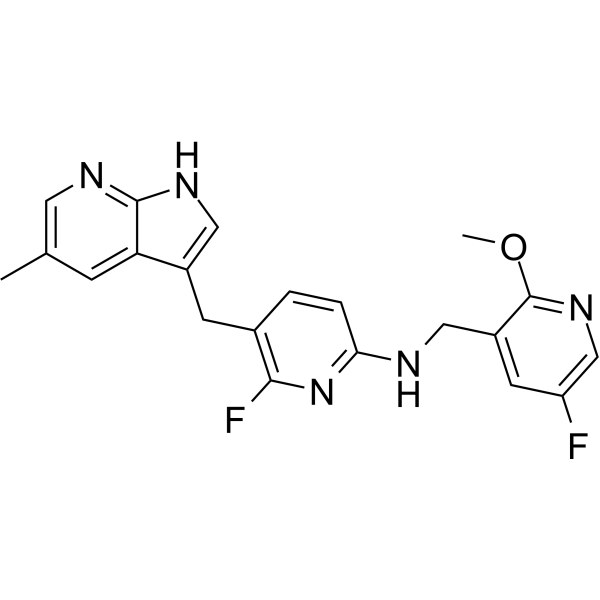
- HY-101034
-
|
CHMFL-ABL-KIT-155
|
|
|
|
CHMFL-ABL/KIT-155 (CHMFL-ABL-KIT-155; compound 34) is a highly potent and orally active type II ABL/c-KIT dual kinase inhibitor (IC50s of 46 nM and 75 nM, respectively), and it also presents significant inhibitory activities to BLK (IC50=81 nM), CSF1R (IC50=227 nM), DDR1 (IC50=116 nM), DDR2 (IC50=325 nM), LCK (IC50=12 nM) and PDGFRβ (IC50=80 nM) kinases. CHMFL-ABL/KIT-155 (CHMFL-ABL-KIT-155) arrests cell cycle progression and induces apoptosis .
|
-
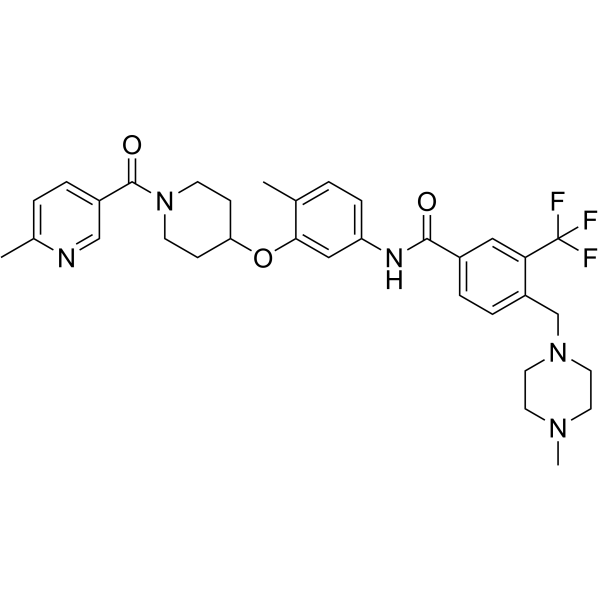
| Cat. No. |
Product Name |
Target |
Research Area |
-
- HY-P99245
-
|
RG 7155; RO 5509554
|
c-Fms
|
Cancer
|
|
Emactuzumab(RG 7155) is a specific monoclonal antibody that inhibits colonystimulating factor 1 receptor (CSF1R) activation. Emactuzumab has high affinity for CSF-1R with Ki value of 0.2 nM to blocks CSF-1R dimerization. Emactuzumab can be used for the research of several diseases, such as diffuse-type tenosynovial giant cell tumour (dt-GCT) .
|
-
- HY-P99259
-
|
FPA 008; Anti-Human CSF1R Recombinant Antibody
|
c-Fms
|
Inflammation/Immunology
Cancer
|
|
Cabiralizumab (FPA 008) is an anti-CSF1R monoclonal antibody (MAb). Cabiralizumab enhances T cell infiltration and antitumor T cell immune responses. Cabiralizumab inhibits the activation of osteoclasts and blocks bone destruction, and can be used in the research of rheumatoid arthritis (RA). Cabiralizumab can combine with Nivolumab (HY-P9903) for lung cancer research .
|
-
- HY-P990257
-
-
- HY-P990125
-
|
|
Inhibitory Antibodies
|
Others
|
|
Anti-Mouse CSF1R (CD115) Antibody (AFS98) is a rat-derived IgG2a, κ type antibody inhibitor, targeting to mouse CSF1R.
|
Your information is safe with us. * Required Fields.
Inquiry Information
- Product Name:
- Cat. No.:
- Quantity:
- MCE Japan Authorized Agent:
































































